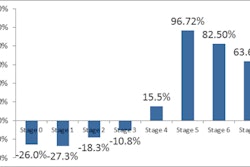Pediatric patients are now getting their own electronic health record (EHR) format with children-specific data elements, thanks to a new initiative from the U.S. Department of Health and Human Services' Agency for Healthcare Research and Quality (AHRQ) and the Centers for Medicare and Medicaid Services (CMS).
The children's EHR format was authorized by the 2009 Children's Health Insurance Program Reauthorization Act (CHIPRA) and developed by AHRQ and CMS. The format is designed to improve care for children, including those enrolled in Medicaid and the Children's Health Insurance Program (CHIP), by guiding EHR developers to understand the types of information that should be included in EHRs for children.
The format includes a minimum set of data elements and applicable data standards that can be used as a blueprint for EHR developers to create a product that can capture the types of healthcare components most relevant for children.
Child-specific data elements and functionality recommendations are sorted into topic areas including prenatal and newborn screening tests, immunizations, growth data, information for children with special healthcare needs, and child abuse reporting.
The EHR format provides guidance on structures that permit interoperable exchange of data, including data collected in school-based and primary and inpatient care settings. The format is compatible with other EHR standards and facilitates quality measurement and improvement through the collection of clinical quality data.



















